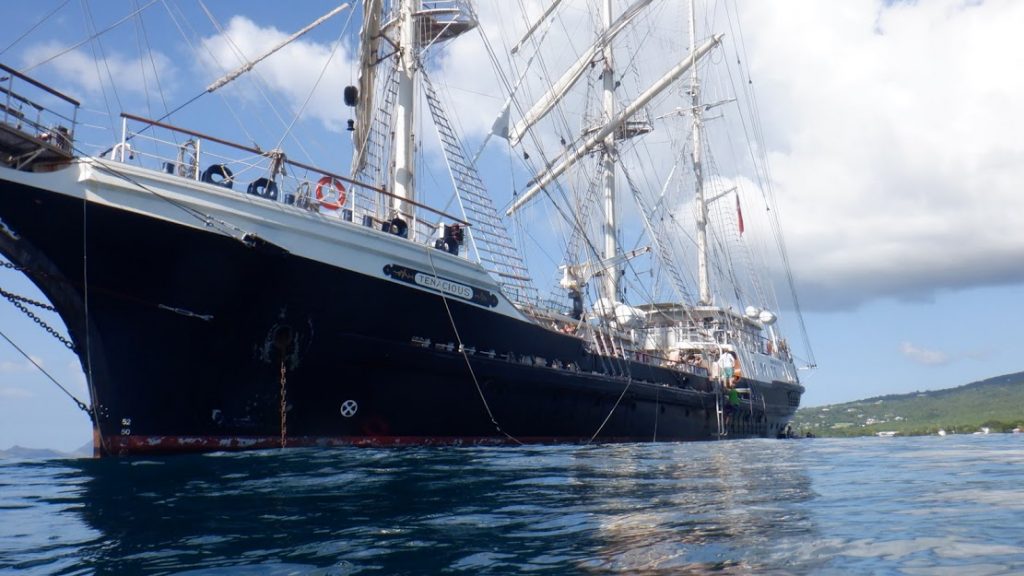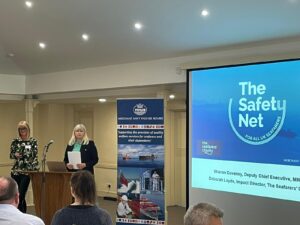Troubled JST allows donors to withdraw donations
 Tenacious JST
Tenacious JST
Peter Cardy reflects on the chequered history and mixed reactions to a new appeal for funds by the Jubilee Sailing Trust.
The Jubilee Sailing Trust (JST) has announced it has exceeded its £500,000 fundraising target despite its April 2022 appeal for funds receiving mixed reactions from supporters.
On 8 April 2022, the Jubilee Sailing Trust issued an appeal stating that it would be forced into ceasing operations ending a 44-year history, unless it could urgently raise a minimum of £500,000 by 14 April and a total of £1.2 million by the end of September 2022. But during the appeal the JST has had to issue several clarifications following members of the public taking to social media to question how the funds raised would be spent – in light of the JST’s troubled 2019 fundraising appeal, which was marred by how funds were eventually spent. During this 2022 fundraising appeal the JST issued clarifications on how the money would be spent and even offered the public the option to withdraw donations made.
The JST stated: ‘Ahead of reaching the target we have sought support from donors to use some of the funds raised to meet payment of unpaid wages and support for Tenacious to deliver the current voyage to Jersey. These aims were clearly stated as part of the original purposes of the Covid Recovery Campaign. We would ask anyone not supporting this and wishing to have the donation returned to contact us at: covidrecoverycampaign@jst.org.uk. The long-term financial strategy of the JST is to continue to raise funds in the form of donations to get to a total of £1.2m by the end of September 2022 and to complete the sale of Lord Nelson. We also wish to explore the potential for a sale and leaseback arrangement for Tenacious.

The JST responded to the Facebook comments earlier in May on its website stating: ‘We do apologise to those people who have found our communication to be misleading. The Covid Recovery Campaign was launched with clear messaging and a target of £500k to be raised by 14 April. Funds raised were to be ring-fenced until the £500k target had been reached. The response to the campaign was extraordinary and many loyal donors asked us to extend the appeal to get us to the target. After seeking advice we agreed to do that.’
A month after the 2022 appeal was launched, the JST thanked its supporters for having reached the initial target of £500k though donations, pledges and in-kind gifts, of which an unspecified proportion will be cashable. The chair of trustees announced that the Trust is open to new ideas such as crowdfunding and will be rethinking its structure, but at the same time restated that ‘to deliver our mission, we rely entirely on fundraising and subsidised berths for voyages to fund our operations’. It is reasonable to ask why the JST has become dependent on emergency appeals to fund its normal operations, and if this is sustainable in the post-pandemic economy.
JST chair Charles Humpleby, who also acts as chair of the Jersey branch says: “We will push on to maintain the current momentum to keep raising emergency cash. We are now at over £520k with a number of pending applications to trusts and foundations to the tune of £65k.
“Furthermore, we are in discussions with a number of larger institutions to take us forward to the £1.2m mark. That being said, we continue to seek support from our watchkeepers, volunteer branches, and our supporters to continue to donate and seek out new funding ideas.”
Humpleby continued: “We are positive in our continued discussions regarding the sale of Lord Nelson. We are delivering our hugely popular voyage programme and we are looking for opportunities to charter Tenacious with the right partner at an appropriate time to fit in with this.
“We will simplify the charity’s two-company organisational structure and support a working group to evaluate whether it is a viable idea to enable crowdfunding to buy into Tenacious, and as such be involved in the ownership and running of the business that supports her. We are particularly keen to get your ideas and input on this.”
Troubles in 2019
Reaction to this year’s JST emergency appeal was mixed, not least because the organisation’s 2019 emergency appeal for £1 million was somewhat marred by poor communication about how and when the funds would be spent.
In 2019, after several months of mixed messages from the previous CEO about its financial position, the Jubilee Sailing Trust (JST) abruptly announced an emergency appeal for £1m. The money was said to be required within a week otherwise the charity would be compelled to cease operating. Whether that was threatened by the charity’s bankers, its accountants, trade or personal creditors was not explained.
Such was the strength of sentiment for the work of the Trust and its two tall ships, Lord Nelson and Tenacious, that the target was met and indeed exceeded. Some weeks later, the trustees were said still to be deciding how to use the funds. And a little later still, it was announced that Lord Nelson would be laid up, offered as a static dockside attraction, or sold. Supporters of the JST and the appeal were shocked by this, which was not foreshadowed in the appeal.
The communication around the 2019 emergency was not well-managed. Some previously loyal supporters felt that their good nature had been taken for granted or even abused in that appeal, perceiving it as the JST crying wolf.
Next steps
No one pretends that the economics of sail training are easy, and the shores of many of the world’s oceans are littered with failed projects. The pandemic meant that most of the 30+ UK sail training organisations were out of action for the entire year in 2020, and were unable to operate a full season in 2021. With a combination of financial planning, support and flexibility from their donors and supporters, government schemes and generous grants from the Association of Sail Training Organisations, none went bust in spite of gloomy prophecies and all restarted their programmes for 2022. So the fresh appeal from the JST this April was a surprise to most.
There is much emotional attachment to the ships and there remains a good deal of rancour about the disposal of Lord Nelson ‘the wrong choice’ some assert, though a decision to dispose of either ship could only be a choice of evils.

In the sail training sector in 2022 there has been puzzlement at how things could have gone so badly wrong, so quickly, after the apparent success of the 2019 appeal and concern at the effect of another similar appeal on the reputation of the sector as a whole. Some operators report having been refused services by suppliers taking one sail training organisation to represent the entire sector.
In the previous emergency the JST was delphic, evasive and eventually angry in its responses to tough questions. The second time around, the charity has been more forthcoming in its published FAQs about the situation and the circumstances that led to it. It became clear that there is a formidable list of unpaid debts to trade suppliers, staff and HMRC among others, and loans from individuals that could not be repaid. However, it does not seem plausible to blame the entire situation on the pandemic, as the ‘Covid Recovery Appeal’ headline on some of its website posts suggests. The problems seem to have accumulated and not been dealt with over a much longer period.
A difficult business model
There is no doubt that the JST inherited a difficult business model. The ships operate under the scrutiny of the Maritime and Coastguard Agency (MCA). The MCA has from time to time been tolerant of the JST as a good cause, and at other times has applied the regulations to the letter. Lord Nelson and Tenacious are ships, unlike most of the smaller sail training vessels that are classified as commercial yachts, with a somewhat less onerous regulatory regime (though it may not look like that to the operators). The JST ships are expensive to run, to dock, to repair and to staff, even with the extensive volunteer help of relief officers, watchleaders, bosun’s mates, cooks and engineers’ assistants. Some commentators suggest that at 40+ berths the ships are exactly the wrong size, either too big or too small to be financially viable.
Beautiful though she is, Tenacious was laden with debt from the outset. Her costs escalated constantly during the build, and worldwide there are only a handful of ships built by the same timber/epoxy system: hard to construct, even harder to recycle at the end of their working life. After decades, mechanical and electrical systems, electronics, sails and rigging age and break down on any ship, and replacements are expensive. For some years JST did not have a planned maintenance programme for the ships, so replacements and repairs were only in response to failures. This sometimes put the sea staff to the embarrassment of having to explain to voyage crews why the ship could not adhere to the advertised itinerary.
Much hope was pinned on the prospect of a series of training voyages for the Royal Navy, though after the initial season these have disappeared from the programme. JST’s difficulty has been compounded by past decisions about staffing, with excessive numbers of highly-paid staff ashore, at one point ballooning to a complement of 30: it now stands at 11fte. In contrast, Adventures Under Sail has a shore staff of 5.2fte, and Ocean Youth Trust South, which operates the largest of the sail training yachts – Prolific — has a shoreside staff of 4fte. Even under the constraints since the last emergency appeal, JST has been unable to resist appointing senior staff on salaries out of proportion to the scale of the job and the market norms. Its 2021 accounts show one in the £60-70,000 band, another in the band £70-80,000 and the highest paid between £110-120,000.
Assets and opportunities
Unlike most of the sail training organisations in membership of ASTO, the JST has never confined its market to ‘young’ people (however defined) and voyages can have a mix of ages from teens to 80s. A voyage can often prove to be a formative and life-changing experience for adolescents, while for many adults and older people sailing on a tall ship is inspiring and the realisation of a long-cherished dream. JST has stayed with a subsidised voyage payment structure, which has enabled people on low incomes to sail, but has also required constant fundraising to meet the built-in deficit. Might the explosion in the cruise market pre-pandemic hold opportunities? Tenacious and Lord Nelson are not cruise ships: no casino, no shopping mall, no valet service. But it is arguable that with some adjustments to the itinerary and staffing, there is a market prepared to pay realistic and higher prices for an authentic working experience, as borne out by the Clipper Round The World races.
With 30+ sail training organisations promoting their offers in the UK, the marketplace is crowded and fragmented: surely mergers, collaborations, or at least joint marketing offer a pathway forward?
Are there other avenues to explore? Norway (population 5.4 million) operates three square-riggers, each one linked to its home port and supported as a matter of civic pride. The question of a national ship constantly reappears on the political agenda in the UK (population 67 million) and Tenacious is a ship ready-made to embody national tradition and pride.
What happens next?
Without a radical change of programme, and effective marketing of a focus and quality not seen for many years, merely tinkering with the model means the maelstrom awaits yet again. Next time around there might be no other option than insolvency and administration. This would mean greater pain for creditors and benefactors, and unforeseen outcomes such as the possibility of the ship being sold out of the UK. But it could also mean the operation being taken on by an organisation that is not saddled with the past business model and with the freedom and creativity to make a fresh start.
Responsibility for the management of a charity rests with the trustees, who are by law unpaid volunteers. During the previous appeal they kept their heads down until stung into response by some of the trenchant criticism. This time they have so far remained widely silent, though behind the veil they must be agonising over a rescue plan for the JST. No one would envy them their job.













Well written article, particularly due to the sensitivities of not wanting to be critical of what is a much-loved organisation which is now in a situation which is reflecting on other well-meaning boating charities. They may not have the same financial pressures as the JST due to different funding/operational models but, the perception of the JST sitation by the public, donors, sponsors, marine sector and the disabled community does reflects on us all.
Hi Ernie,
I largely agree with you but as I have no hesitation in criticising the Trust management – at one point they had more shore-based directors than captains (nearly twice as many if I recall correctly). They had one Director who re-launched the then much loved logo of a tall ship with some rainbow sail which meant absolutely nothing to the public at large. He launched this despite almost unanimous condemnation by everyone who saw it at a cost of god knows how much – needless to say it had been a total flop with merchandise sales almost non-existent. Add to that a second round-the-world trip a year or so after the first one failed financially and you have to seriously question the business acumen of both the Trustees and senior management team – just two examples amongst many of poor decisions that have led to the loss of one ship and the likely loss of the other (even with two emergency appeals) unless serious changes are made and communication with their core supporters improves. The latter is especially important as we feel that we are now simply cash cows for the Trustees and management.
Does this include reinstating ‘Fred the Fish’ Normandale Bosuns Mate, someone who has spent a lifetime at sea, owning and administering North Sea fishing vessels and who attempted to suggest options the former CEO. He became more and more frustrated at not even receiving an acknowledgement for his concerns.
Fred arrived in Lisbon to join Tenacious; pre lockdown, to be told he wasn’t allowed to sail!!
He has done approximately 90 voyages, on both ships, always paying his own way, has donated £1000s of equipment, raised more £1000s, done talks and always promoted the JST.
If the new regime is drawing a line under the mismanagement of the previous administration, shouldn’t this extend to Fred’s unwarranted dismissal?